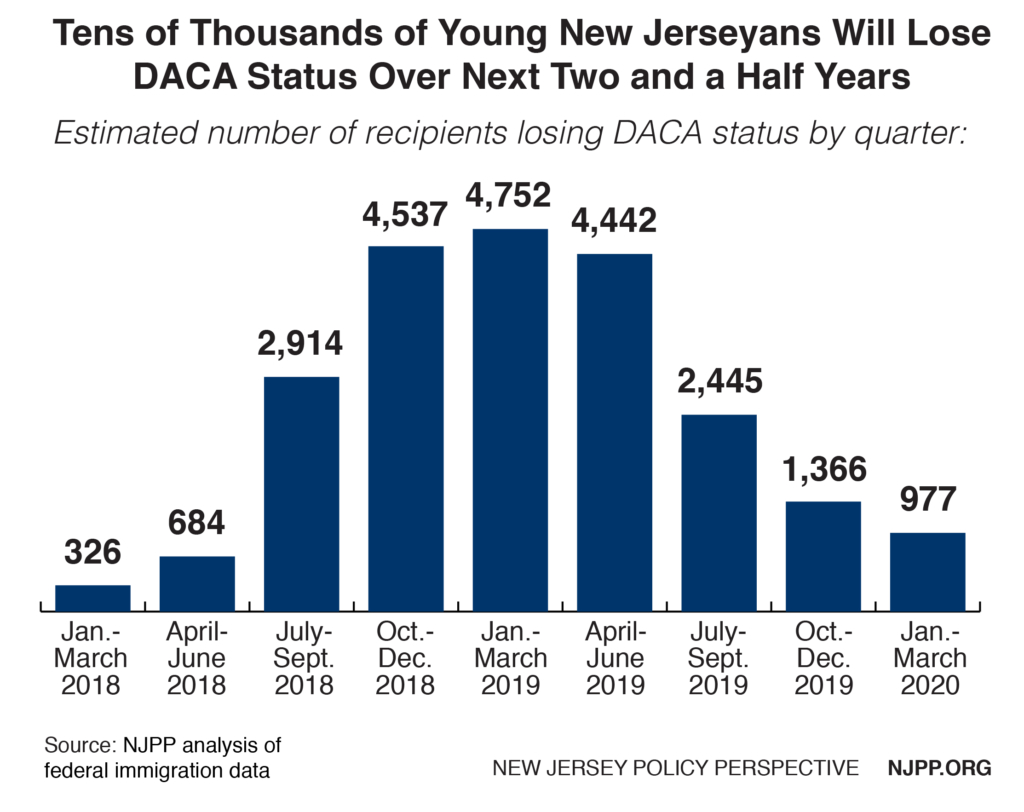To read a PDF version of this report, click here.
Earlier this month the federal government announced the end to the common-sense 2012 immigration initiative that has allowed about 22,000 young New Jerseyans the opportunity to pursue the American Dream and contribute to the state’s economy. By rescinding the Deferred Action for Childhood Arrivals (DACA) program, the Trump administration is wasting the potential of these young striving immigrants – and causing serious harm to the Garden State’s economy.
 Only eight states have a higher number of DACA recipients than New Jersey.[1] Those eligible for DACA live all over the state, but are clustered largely in New Jersey’s most populous counties. Of these young New Jerseyans, 87 percent are working.[2] They contribute $66 million in state and local taxes each year, the seventh highest level of all states. Ending DACA will cause a 32 percent reduction in those tax payments.[3]
Only eight states have a higher number of DACA recipients than New Jersey.[1] Those eligible for DACA live all over the state, but are clustered largely in New Jersey’s most populous counties. Of these young New Jerseyans, 87 percent are working.[2] They contribute $66 million in state and local taxes each year, the seventh highest level of all states. Ending DACA will cause a 32 percent reduction in those tax payments.[3]
But the coming harm to New Jersey’s economy is much broader than the reduction in tax collections. In fact, DACA’s repeal will cause the Garden State to lose an estimated $1.6 billion each year in state Gross Domestic Product – the fifth largest dollar loss of all states.[4]
The Trump administration’s six-month delay in ending DACA means that an estimated 2,700 young New Jersey immigrants – or about 12 percent of all DACA beneficiaries in the state – will be able to renew their permits for two more years. This is much lower than the estimated share of DACA beneficiaries that will be eligible for renewals nationwide (25 percent).[5] Those who are able to renew will have their DACA status extended through late 2019 or early 2020.
Of New Jersey’s entire population of DACA beneficiaries, most – an estimated 61 percent – will lose their eligibility for a work permit and deferred action for deportation between October 2018 and June 2019.[6]
What Happens Next
- All applications received before September 5, 2017 will be processed with no change.
- New applications received after September 5, 2017 will be rejected.
- Young immigrants whose DACA status expires between September 5, 2017 and March 5, 2018 must submit renewal applications by October 5, 2017.
- The government will no longer give DACA recipients who qualified to travel abroad permission to do so.
- Each person’s DACA status remains valid until his/her permit expires.
On the ground, this means that many DACA recipients will lose their jobs, and – as stated above – New Jersey will lose economic benefits and tax revenue. But the loss goes deeper than that.
Many who lose their jobs will also lose their employer-based health coverage and be left with nowhere to turn, since DACA recipients aren’t eligible to purchase insurance on the federal Marketplace or through the state. Those who lose DACA status also won’t be able to continue driving legally, and – most importantly – will lose protection from deportation. The latter will force these young immigrants back into the shadowy underground cash economy, limiting their economic security, and will cause them and their loved ones to once again live each day in fear.
Endnotes
[1] United States Citizenship and Immigration Services, Number of Form I-821D Consideration of Deferred Action for Childhood Arrivals, March 2017.
[2] Center for American Progress, A New Threat to DACA Could Cost States Billions of Dollars, July 2017.
[3] Institute on Taxation and Economic Policy, State & Local Tax Contributions of Young Undocumented Immigrants, April 2017.
[4] Ibid 2
[5] Cato Institute, How DACA Will End – When DACA Permits Will Expire, September 2017.
[6] To project when DACA authorizations would expire, NJPP analyzed United States Citizenship and Immigration Services data on DACA applications by quarter, 2015-2017.


